Welcome back to the In-App Purchase Inspector - our regular look at free-to-play games from the consumer's perspective.
In each instalment, we consider the incentives or pressure applied to make in-app purchases, their perceived value, the expansion offered by IAPs and the overall value of the experience.
The end goal is to see whether the game makes a good enough case for us to part with our cash, or whether players are content - or engaged enough - to 'freeload'.
This time, we're taking a look at Strike of Kings, a five-on-five mobile MOBA from Tencent and a Western take on its Chinese hit Honor of Kings.
It's also worth noting that Strike of Kings is still in soft launch for testing in selected countries, and as such its features are subject to change. Thus, we will not be assigning a full verdict until the game's global launch.
Go West
With Honor of Kings, Tencent proved that a MOBA can engage a massive player base on mobile. It had more than 50 million daily active users as of January 2017 and was a major revenue driver for Q4 FY16.
Tencent is looking to seize the opportunity by bringing Honor of Kings to the West.
But this is in China, a country with a vastly different gaming culture to the US and Europe. And in the West, the success of the MOBA genre has been limited almost exclusively to PC.
That's not to say there have been no attempts, however. The most high-profile of Western mobile MOBA has been Vainglory, which has made inroads in eSports but has not consistently made an impression on the top grossing charts in the US.
And so Tencent - which also owns Supercell, developer of the MOBA-inspired Clash Royale - is looking to seize the opportunity by bringing Honor of Kings to the West.
Renamed Strike of Kings, the game features more Western-friendly heroes than the characters from Chinese mythology comprising Honor of Kings' original roster, and even boasts a DC Comics license with Batman joining the fray.
A new arena
But Strike of Kings is not trying to be, nor is it ever likely to be, a mainstream proposition. Good effort has been made towards accessibility, but this kind of competitive gameplay is less embedded in popular culture in the West than it is in Asia.
The comparisons between it and League of Legends are apt, both being highly competitive titles that rely on great strategy and skill on the player's part to battle at the highest level.
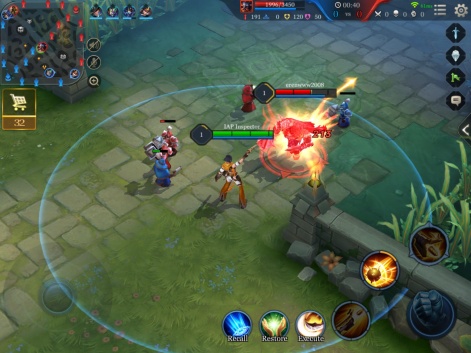
This isn't a game you can idly tap at on a bus. It demands both hands, ideally on a tablet, and full concentration for a tussle that ebbs and flows over 15 to 20 minutes as both sides try to destroy one another's bases to win the bout.
Strike of Kings favours a virtual joystick over a tap-to-move system.
But favouring a virtual joystick on the left of the screen to the tap-to-move system that's been common among mobile MOBAs, as well as featuring a slick onboarding and tutorial process, perhaps it can serve as an introduction to the complex world of MOBAs for first-timers.
A different economy
For those unfamiliar with MOBAs, the economy of Strike of Kings will stand out as being different from the average mobile game.
This is because, to preserve a level playing field for competition, shelling out on 50,000 Diamonds to upgrade your character and get the killer edge isn't really an option here.
For the average player, this has a positive impact. It means that the basic experience is the same for all, whether they've spent money or not, and that nothing fundamental is hidden behind a paywall.
Instead, like the MOBAs on PC, monetisation in Strike of Kings is built around its roster of heroes. Each has their own set of abilities and proficiencies, serving a different role in battle.
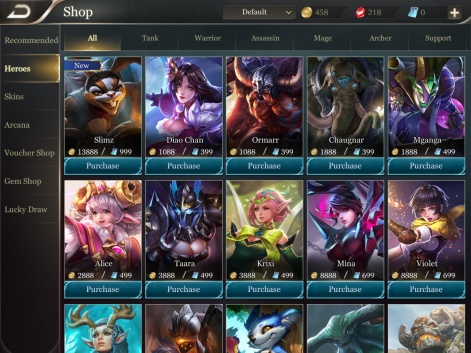
From Thor-esque Norse adonises to enormous stone golems, it shows that plenty of time has been given to designing the game's playable heroes - and while most will ignore it, each even has their own back story.
The thrust of Strike of Kings is distinct from the majority of its mobile F2P peers.
This is because in a MOBA, what the developer is selling is their characters and the clearly differentiated experience of playing as each of them.
This makes the entire thrust and focus of Strike of Kings distinct from the majority of its mobile F2P peers.
Get good
First things first, Strike of Kings wants its players to play the game.
It gets you battling quickly, offering rewards for wins, the theory being that the more a player is immersed in competing, the more likely they will be to spend money in honing their own strategies.
Furthermore, in a MOBA - particularly one at such an early stage - building a community is key, and player engagement is a prerequisite for meaningful profit.
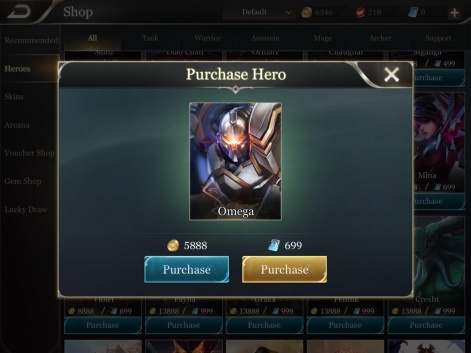
As such, the two main currencies in Strike of Kings - Gold and Gems - are both earned simply for playing the game, awarded for playing matches and completing quests respectively.
Batman is the only hero who can't also be unlocked using soft currency.
Gold can be used to buy new heroes, while Gems can be put towards changeable offerings in the Gem Shop - from double gold or EXP cards that boost your rewards for set period, to chests containing heroes.
Style it out
The hard currency in Strike of Kings is Vouchers, which can be bought in bundles ranging from $0.99 for 100 to $99.99 for 14,000.
Vouchers can be used to buy heroes, but at present, Batman is the only character in the game who can't also be unlocked using soft currency Gold.
The DC Comics hero costs 1,799 Vouchers ($15.97 in real money), making him the most expensive hero in the game.
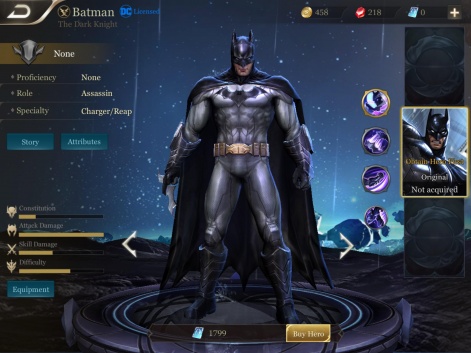
This does give the character a sense of worth and exclusivity, but some dedicated players might be frustrated that no matter how long you play, Batman can't be unlocked without spending money.
Other uses for Vouchers include Magic Crystals, each of which can be used to enter the gacha-style Lucky Draw to win currency or heroes. These cost 100 Vouchers apiece, but can also be bought from the Gem Shop.
Vouchers can be used to buy skins, a purely aesthetic addition.
Other uses for Vouchers include double Gold and EXP cards and interestingly, the cheapest available purchase at 40 Vouchers, an item called Sonika that allows the player to broadcast a message to the game's main menu.
Vouchers can also be used to buy skins for existing characters, which are a purely aesthetic addition.
Something for the fans
There are other incentives to spend along the way - the impressive-looking warrior Zephys is avaiable as a bonus for the player's first purchase, for instance, and there are some reasonable limited-time offers - but the vast majority of players here will be happy with the free offering.
As has been seen with PC MOBAs, the key to monetising these experiences is by building around the characters - be that through aesthetic changes or genuine, meaningful gameplay differentiation - and offering value that does not infringe upon those who are playing for free.
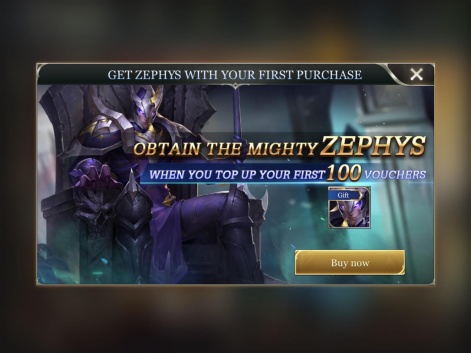
Indeed, those players have their own intrisic value in the fact they are populating games, building the all-important community, and giving the spenders an audience to parade their fancy new skin or premium character in front of.
Strike of Kings admirably translates the appeal of the MOBA to mobile.
Whether Strike of Kings can replicate the phenomenal success that Honor of Kings has enjoyed in China remains to be seen. It would certainly take a brave individual to bet on it.
However, while features are subject to change in this soft launch period, Strike of Kings admirably translates the appeal of the MOBA to the mobile space, monetising the committed user through optional purchases while leaving the majority to simply play.
And whether or not it becomes a top grossing hit, it may well help pave the way for a mobile MOBA that does.
We'll be assigning our full verdict of the game upon its global launch.
















